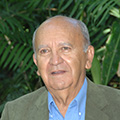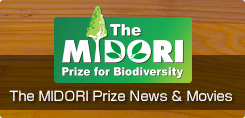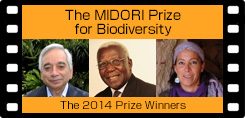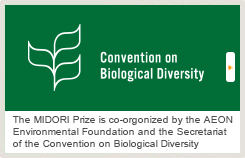The MIDORI Prize for Biodiversity 2012

- Rodrigo Gámez-Lobo
- Costa Rica
President, Instituto Nacional de Biodiversidad (INBio)
Remarks
In 1989 a small group of enthusiastic biologists and conservationists in Costa Rica decided voluntarily to embark on an adventure: to create a National Biodiversity Institute, INBio, with the ambitious mission "to promote a greater awareness of the value of biodiversity as a means to ensure its conservation and improve the quality of life of human beings."
Based on the premise that the best way to conserve biodiversity is to "know it" and "use it" sustainably, in an intelligent way, for spiritual, intellectual or economic purposes, INBio complemented the first and necessary "save" step of creation of a national system of wild protected areas conducted by the Government. The "save," "know," "use" trilogy of Costa Rica's conservation strategy was thus born.
Twenty-three years later, and thanks to the sustained political endorsement of the Government of Costa Rica, the intellectual collaboration of the scientific community and the financial support of visionary developed countries Governments, the dream is coming true. INBio has made tangible and solid contributions to the knowledge, sustainable utilization and awareness of the value of the country's biological wealth.
If the MIDORI Prize is recognition of the privileged role I played in the exciting adventure of guiding INBio these years, I wish to take this opportunity to gratefully acknowledge the AEON Environmental Foundation, the Secretariat of the Convention on Biological Diversity, the Prize Jury and those responsible for my nomination.
What you are recognizing is an effort in the human quest of peace with nature.
Reasons for Awarding the Prize
Prior to the Rio Earth Summit in 1992, Drs. Rodrigo Gámez-Lobo and Daniel Janzen founded Instituto Nacional de Biodiversidad (INBio) in 1991 in order to organize the inventory of biodiversity. Dr. Gámez has contributed to the organization of the inventory in Costa Rica through training of parataxonomists, and has made significant efforts for thoroughly introducing biodiversity into the school and university curricula. He has headed the INBio since its establishment and presented the importance of biodiversity in a unique and concrete way. His achievements are outstanding. He has also been successful in providing ecotourism income more valuable than agriculture to Costa Rica through designating a stable set of national parks covering 25% of Costa Rica, a country of mega-diversity. He has demonstrated a good model of conservation and sustainable use of biodiversity to tropical countries that have problems of development and conservation. Thanks to his persistent commitment, his research activities facilitated policy which is now the foundation of lifestyle and nature tourism and a pathway to economic development, and put biodiversity on Costa Rica's national agenda. Among his numerous contributions, his work has shown that good science can and does lead to good policy and governance. His contributions to major issues of the Convention on Biological Diversity, including the Global Taxonomy Initiative and access and benefit sharing, are also highly evaluated.
Profile
Dr. Rodrigo Gámez-Lobo (b. 1936) holds a PhD in Plant Virology from the University of Illinois (1966) and was a research professor at the University of Costa Rica for over three decades (1958- 1990), where he also held numerous administrative positions, including Head of the School of Plant Sciences, Vice-Rector for Research, and Director of the Cellular and Molecular Biology Research Center. During the course of his scientific career, he worked and published extensively on viruses of basic food crops in Central America, insect transmission of plant viruses and molecular characterization of those viruses. He was also active on numerous national and international boards and institutional committees of organizations such as Costa Rica's National Research Council, the Organization for Tropical Studies and the American Phytopathological Society-Caribbean Division. He is currently a member of the Costa Rican National Academy of Sciences and is also associated to several local educational and sustainable development foundations.
As Biodiversity Advisor to President Oscar Arias (1986-1990), Dr. Gámez ran the process that led to the establishment of the National System of Conservation Areas within the first Ministry of Natural Resources (presently the Ministry of the Environment), and to the creation of the Instituto Nacional de Biodiversidad (INBio), as a private, non-profit, public interest organization. He served as General Director (1989-2003) and has been President of the Board of INBio since the institution's foundation in 1989. This organization has rapidly consolidated as a leading institution in the generation, management and transfer of biodiversity information, and became to be well known as a worldwide model of the institute for biodiversity research. INBio was founded as a NGO, and has worked in close coordination and collaboration with the Ministry of the Environment. The objectives of the organizations are to conduct an inventory of Costa Rica´s biodiversity, organize and process the information, and promote the flow of this information nationally and internationally. Its activities include the Inventorying and Monitoring, Education and Bioliteracy, Bioprospecting, Policy and Legislation, Land use management and Technical Assistance and Capacity Building. According to its great contributions, INBio has received numerous national and international recognitions and awards.
Dr. Gámez has been also associated with numerous national and international initiatives in biodiversity conservation. He made significant contribution in making "Global Biodiversity Strategy" (WRI, IUCN, UNEP, 1992). As a Costa Rican Government delegate, he was active in the formulation of the Convention on Biological Diversity and served on a number of UNEP biodiversity-related advisory committees. He also coordinated the National Biodiversity Advisory Board of the Ministry of the Environment (1994-1998) that played a fundamental role in the formulation of the Costa Rican National Biodiversity Law and the National Biodiversity Strategy. Dr. Gámez has written and lectured extensively (1990-2012) on Costa Rica's pioneering efforts in biodiversity conservation and sustainable development.
* This profile was prepared in 2012.
Record of Awards
- 1983
- Bernardo Houssei Prize in Science (Organization of American States)
- 1992
- Peter Scott Award (IUCN's Commission for the Species Survival) (Awarded to INBio under his leadership)
Honorary Award (Banesto Cultural Foundation, Spain) - 1995
- Prince of Asturias Prize in Science and Technology (Prince of Asturias Foundation, Spain)(Awarded to INBio under his leadership)
- 1997
- Leonov Medallion (Association of Space Explorers)
- 2004
- Green Globe Award (Rainforest Alliance, USA)
Distinguished Scientist (Ministry of Science and Technology, Costa Rica) - 2007
- Doctor Honoris Causa (Tropical Agricultural Research and Education Center)
- 2010
- Emeritus Professor (University of Costa Rica)
- 2011
- The Magón National Prize for Culture (Ministry of Culture, Costa Rica)
List of Major Publications
Dr. Rodrigo Gámez-Lobo's representative Books and Articles










